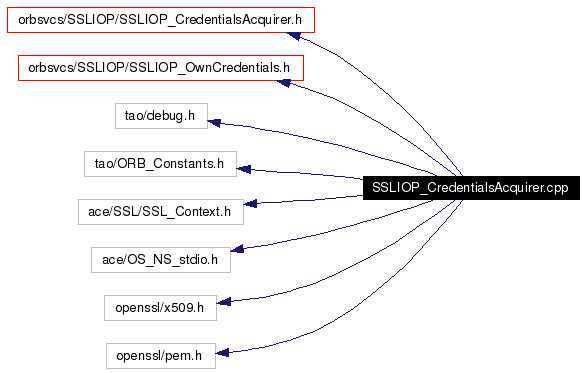
#include "orbsvcs/SSLIOP/SSLIOP_CredentialsAcquirer.h"#include "orbsvcs/SSLIOP/SSLIOP_OwnCredentials.h"#include "tao/debug.h"#include "tao/ORB_Constants.h"#include "ace/SSL/SSL_Context.h"#include "ace/OS_NS_stdio.h"#include <openssl/x509.h>#include <openssl/pem.h>Include dependency graph for SSLIOP_CredentialsAcquirer.cpp:

Go to the source code of this file.
Defines | |
| #define | TAO_SSLIOP_PASSWORD_CALLBACK_NAME TAO_SSLIOP_password_callback |
Functions | |
| int | TAO_SSLIOP_PASSWORD_CALLBACK_NAME (char *buf, int size, int, void *userdata) |
|
|
Definition at line 27 of file SSLIOP_CredentialsAcquirer.cpp. Referenced by TAO::SSLIOP::CredentialsAcquirer::make_EVP_PKEY(), and TAO::SSLIOP::CredentialsAcquirer::make_X509(). |
|
||||||||||||||||||||
|
Definition at line 33 of file SSLIOP_CredentialsAcquirer.cpp. References ACE_OS::memcpy(), ACE_OS::memset(), and ACE_OS::strlen().
00037 {
00038 // @@ I'm probably over complicating this implementation, but that's
00039 // what you get when you try to be overly efficient. :-)
00040 // -Ossama
00041
00042 const char * password = static_cast<char *> (userdata);
00043
00044 int pwlen = -1;
00045
00046 if (password != 0)
00047 {
00048 pwlen = ACE_OS::strlen (password);
00049
00050 int copy_len = pwlen + 1; // Include the NULL terminator
00051
00052 // Clear the portion of the buffer that exceeds the space that
00053 // will be occupied by the password.
00054 if (copy_len < size)
00055 ACE_OS::memset (buf + copy_len, 0, size - copy_len);
00056
00057 // Make sure we don't overflow the OpenSSL supplied buffer.
00058 // Truncate the password if necessary.
00059 copy_len = (copy_len > size) ? size : copy_len;
00060
00061 ACE_OS::memcpy (buf, password, copy_len);
00062
00063 // NULL terminate the truncated password.
00064 if (copy_len > size)
00065 {
00066 pwlen = size - 1;
00067 buf[pwlen] = '\0';
00068 }
00069 }
00070
00071 return pwlen;
00072 }
|
 1.3.6
1.3.6